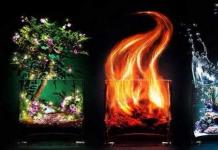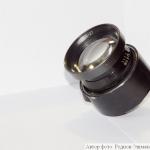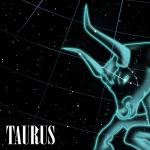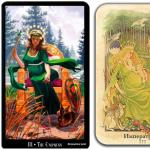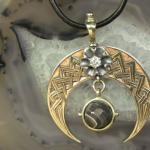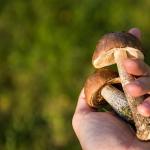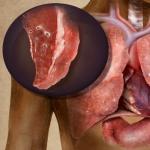drum a- a place in the hut, usually in the kitchen, for couples in love during gatherings
drum and tsya - sit in the drum (cm.)
white at c - broom grass
b e reg - threshing current edge
bespel Yu ha - stupid woman
ble I t - shout loudly (about a sheep), disapproving. fabric error
b about rko, adv. (from to take) - to take strongly, to pull
brun and to pour - to pour (about an oat ear)
b at nya ( distorted gunya) - any clothes sewn from canvas
ver e tie - dry elevated area among the meadow
in e shake - dry in the wind
vzv a shave - work diligently, with tension
glance I dka - a game of youth on a village arbor. The guy and the girl sit on the ends of the bench and, according to the leader’s account, turn, if in one direction, kiss
water at straight - easy
in about greens, non-cl.- green, unripe (about plants)
gate at shka - the upper part of a women's shirt
vroznokom e face - in different directions butts
vr about tie - in a stretched form
in s crowded - weekend, festive (about clothes, shoes)
in s to alternate - to become quite ready (about the soil for sowing)
in s be generous - flow out of the boxes (about flax seeds, peas)
G a wilted - rope
ch at py - pale (about the color of the fabric)
ch I then, union- therefore, because of this
G about betz - underground in a village hut
yard - a room, a building for livestock with an upper floor
cases yo zhka - the amount of something less than a handful
d e flax - difficult to process
dolb I zhka - a hollowed out hole
additional about toronu - to ashes
d at ty - oval
stuffy and to, caress stuffy - a hole for a samovar pipe on [p. 100:] front side of the Russian stove on the side of the mouth
and and that is flour
head a pa - food for chickens, boiled husks from flax heads and sprinkled with flour
tan about dka - a kitchen in a village hut
ass about rnitsa - diligent worker
zakor yo nok - a strong, healthy young man
Hall a wok - kitchen table in the form of a cabinet
suede a ret - overgrown with moss (about a meadow)
honored about n - damper in a Russian oven
zasyk a t - delay
known e ku - long time ago
out of the blue a to succeed - to succeed, to get a good result
ist about bka - attic
cat about k - wooden roller for ironing linen, rolling pin
to about kick - hit
kokorev a ty - rough, uneven, rough (about plant stems)
copra about m, adv.- bunch
sack yo to roll - a game of youth on a village arbor
to at mouth, kurt a shka - men's short coat made of homespun cloth
fret aboutн - platform for threshing
l Yu bottom, adv.- many people, people s e - many people
lal I va - a slow, slow person
l I matted - slightly stretched, sagging
m a slenik - a traveling merchant of oil and other goods
bunk about shny - special
outfit about nka - mummer
crust a vka - the bottom of a women's shirt
early yo nod - strongly, rhythmically knock
weeks about tka - fishing rod
netun I shka - stupid worker
bad e flax - clumsily, carelessly
nose I shchy - everyday, not strong
about and chka - a basket without a bottom
obol about chka - outerwear, mostly warm
cliff a tsya - make shorter, cut off
one a powerful - the same color
rep about hrit - to beat someone
shake off a out - dusty
otyag a t - pull down, make saggy (about the fabric on the camp)
P a zdera - bast
palan I– polynya
[With. 101:] pan about k - playing grandma, cozon
packs a then - carelessly, clumsily
pereb about rka - a wooden partition in the hut that separates the kitchen from the hall
pereg and bisty - cheerful, with games and mischief (on Christmas time)
moving a t - rot, rot
cover I lysh - non-woven part of the warp, strip ( cm. deficiency)
Perkhov a ty - dusty
P e ruff - linseed dust
pov e t - the second floor of the courtyard (cm.) hay storage
pov I zka - a towel given at a wedding
absorb I dock - a keepsake
like at yka - short onuchka
podor e x - boyfriend, admirer
sub about stock, collected- girls and boys 12-16 years old
subst a va - the bottom of a women's shirt
podshk about p - sheepskin in the lining of winter clothes
Mon e bee - attic
honors and t - do not rush to do, wait
poos a distey - shorter ( from settling)
ceiling about k - attic
sentences about rka - ditty
fit about shka - saying
coming a nstvo - dowry of the bride
approx s vka - washing the floor in the hut
prose about risty - bright, beautiful (about the color of the fabric)
good a tny - smooth (about canvas)
promash about th - one-piece, uncut canvas, straight dress without darts, Same checkpoint about th
pror I ny - adj. from pror I nka, a cut loop in a garment
calc and to dismantle - to disassemble, to put in order
remez and ny - bird
R at Bische - clothes
shroud Yu ha, joke. or neglect.- long, loose clothing
sar a y - the same as telling (cm.)
hay and k - a special room for storing hay
siv at n - broom grass
at all e ny ( from with everyone) - everyday, worker (about clothes, shoes)
With about days, adv.- in the afternoon
sodnov a, adv.- time after time, quickly
cn about flatter - roll up, make dense (about woolen fabric)
[With. 102:] stanushka - the bottom of a woman's shirt
pillar at shka - the same as baraba (cm.)
sucre about stump - warm (about water)
suprot and obvious - opposite
suhor about s - summer time, when there is no growth; lack of dew
congress - log flooring, along which they move out of the barn (cm.)
With s to sleep - to collect an ear (about oats)
cheese mill about volume, adv.– without pre-drying (when threshing)
t Yu chewy - wet, damp (about sheaves, fiber)
mouth a clearly - right, beautiful (about work)
tailings a ty - long and thin (about plants, tree branches)
chl yo stky - light, easy to use (about the tool)
hoh about l - a piece of linen tows, wool
xp at brush - large garbage
h a shelly - adj. from a cup
chezh about OK about) - outerwear for men
people I bottom - pantry
h e rare, adv.- in order, in turn
scull e nka - clay fragment, shard
ches about vka - strand of fiber, hair
alien a k - a stranger, a stranger, a person from another village
h at hit - hit
shohrev a ty - rough, undersized, frail (about plants and animals)
[With. 103:] Appendix 4
LIST OF USED LITERATURE
I. Dictionaries
Dictionary of the Russian language, in 4 volumes. Moscow: Russian language, 1981–1984.
Regional dictionaries
1. Bogoraz V. G. Regional dictionary of the Kolyma Russian dialect // Sat. ORAS. - 1901. - v. 68, No. 4.
2. Vasnetsov N. M. Materials for an explanatory dictionary of the Vyatka dialect. - Vyatka, 1908.
3. Gerasimova M.K. Dictionary of the county Cherepovets dialect. // Sat. ORAS. - 1910. - v. 83, No. 3.
4. Dal V. I. Explanatory Dictionary of the Living Great Russian Language. - M .: Russian language, 1978-1980.
5. Dobrovolsky VN Smolensk Regional Dictionary. - Smolensk, 1914.
6. Supplement to the Experience of the Regional Great Russian Dictionary. SPB., 1858.
7. Ivanova A.F. Dictionary of dialects of the Moscow region / Moscow region. ped. in-t im. N. K. Krupskaya. - M., 1969. - 598 p.
8. Kirillova T. V. et al. The experience of the dictionary of the Kalinin region / Kalinin ped. in-t. - Kalinin, 1972. - 312 p.
9. Kulikovsky G. I. Dictionary of the regional Olonets dialect. - St. Petersburg., 1898.
10. Melnichenko G. G. Brief Yaroslavl Regional Dictionary. - Yaroslavl, 1961. - 224 p.
11. The experience of the regional Great Russian dictionary, published by the 2nd department of Acad. Sciences. - St. Petersburg., 1852.
12. Podvysotsky A. O. Dictionary of the regional Arkhangelsk dialect in its everyday and ethnographic application. - St. Petersburg., 1885.
13. Pskov regional dictionary with historical data / Leningrad state. un-t. - L., 1967-1984. - Issue. 1–6.
14. Rastorguev P. A. Dictionary of folk dialects of the Western Bryansk region. - Minsk: Science and technology, 1973.
15. Dictionary of Vologda dialects. - Vologda, 1983-1989. - Issue. 1–4.
16. Dictionary of the dialect of the village of Akchim, Perm region / Perm state. un-t im. A. M. Gorky. - Perm, 1984. - 398 p.
17. Dictionary of dialects of the Solikamsk district of the Perm region / Perm state. ped. in-t. - Perm, 1973. - 706 p.
[With. 104:] 18. Dictionary of Russian dialects of the Middle Urals / Ural state. un-t im. A. M. Gorky. - Sverdlovsk, 1964-1981. – T. 1–3.
19. Dictionary of Russian dialects of the southern regions of the Krasnoyarsk Territory / Krasnoyarsk state. ped. in-t. - Krasnoyarsk, 1968. - 230 p.
20. Dictionary of Russian folk dialects. - M.-L.: Science, 1965-1985. - Issue. 1–20.
21. Dictionary of Russian old-timer dialects of the middle part of the river basin. Obi. - Tomsk: Publishing House of Tomsk University, 1964-1967. – T. 1–3. Supplement: Parts 1–2, 1975.
22. Dictionary of modern Russian folk dialect (village Deulino, Ryazan district, Ryazan region). – M.: Nauka, 1969.
23. Smirnov I. T. Kashinsky Dictionary // Sat. ORAS. - 1901. - T. 70, No. 5.
24. Startseva S. A. A short dictionary for the regional dictionary of Russian dialects of the Perm region / Perm State. ped. in-t. - Perm, 1962.
25. Yaroslavl Regional Dictionary. - Yaroslavl, 1981-1991. - Issue. 1–10 (A–Z).
II. Selected Studies
26. Lebedeva N. I. Spinning and weaving of the Eastern Slavs in the 19th - early. 20th centuries // Proceedings of the Institute of Ethnography. N. M. Miklukho-Maclay. New series. - M., 1956. - T. 31: East Slavic ethnographic collection.
27. Mikhailova L.P. Vocabulary of flax processing, spinning and weaving in Novgorod dialects. - L., 1970.
28. Trubachev O. N. Handicraft terminology in Slavic languages: etymology and experience of group reconstruction. – M.: Nauka, 1966. – 416 p.
29. Chumakova Yu. P. Textile vocabulary of dialects of the Bogoslovshchina district of the Ryazan region. - Gorky, 1966.
[With. 105:] Appendix 5
INDEX OF WORDS
AND TERMINOLOGICAL PHRASES INCLUDED IN THE GLOSSARY*
unit 24
| roll 22 wads 48, 72 tail 56 eyelids 62 eyelids 62 vexhinki 62 rope 67 spindle yarn 50 spindle 38, 48, 55 spindle 38 upper legs 40 top 62, 66 top 20 funny 52 evening 52 Vilashka 42, 55 fork 40, 42, 55 forks 42, 55 viteika 56 |
vodka reed 62 flax fiber 31 fiber 16, 31, 50 fiber yarn 50 hairbrush 24 Volotina 17 volotinka 17 volotka 17 parish 16, 17 sparrow 55 look up 38 octagon 61 eight 61 octagon 78 eight-point canvas 78 eighth 61 eighth yarn |
to stand out 27 to mature 26 to mature 26 to dry out 33 callouts 34 crawl out 19 spin 44 pave 25 survive 19 swear 82 weave 70 view 40, 48, 56 knitter 21 knitting 34 bundle 34 |
| kajimot 53 border 74 stone 78 reed 62 reed reed 62 coil 40, 48 kikimora 53 muslin 78 cell 75 kletchanina 79 plaid 78 club 48 filly 41 feather grass 67 kolodina 68 block 68 bell 17, 64 bell flax 15 bell 19 bells 15 bell 17 beater 36 mallet 22 butt 17, 20 |
twist 41 cone 34 ends 57 kopanitsa 23 kopanushka 23 kopyl 37, 38, 56 root mill 23 root spin 37 Korenovka 23, 37 root 23, 37 root mill 60 root 23, 37 peddler 74 box 87 box 17, 19 cow 40, 56 rocker 67 short warp 55 short reel 43 Bonfire 33 costiga 33 kostika 33 bone 33 kostichina 33 crutch 67 dyer 83 dyer 82, 83 paint 83 redness 58 Krasnoryadets 84 Krasnoyar 84 |
dyed 82 dyed 82 dyed canvas 21, 78 cross 21 cross 75 crooked spindle 38 krivulek 41 crossed harness 59 krosna 57, 60, 76, 84 circles 63, 75 round reel 43 [With. 109:] coarse flax 15 large stem flax 15 coarse linen 15 cool yarn 50 twist 50 spinner 78 hook 67 pod 48 pod 48 somersault 67 kudelina 43 koudelka 32 tow 32, 43 kuzhelek 44 doll 35, 44 curly linen 14 kuftyrek 87 |
| burner 66pakusha 35stick 22, 66stick 68 pastor 67 pastor 67 stepson 68 comb brush 24 comber 36 comb 29 biscuit 24 pachesi 33, 50 pachesina 80 tufted yarn 50 flinch 87 perekolka 23, 68 warp 73 lie down 26 stale flax 30 lie down 26 fallows 30 fallow 26 rewind 59 rewind 59 rewind 59 rewinder 59 overspun yarn 50 crossover 47 trailer 47 shadowing 47 persevere 19 ring 39 dog bird 62 sandy linen 32 pestrina 80 mottled 80 motley 80 moth 80 motley 80 pawn 76 wattle fence 57 close 69 poesmo 35 hangman 35 bandage 80 messenger 16 bleach 82 whitening 82 |
let down 73 burn 27 maid 16 raise 27 footboard 41 footboards 65 footrest 23 tease 29 pillow 41 comb 29 old lady 68 [With. 112:] lie down 19 half canvas 81 flat yarn 50 stripe 75 linen yarn 50 cloth 74 canvas 76, 84 half wallet 78 half-mote 49 semi-coated 49 semi-reel warping 55 half coil 49 semi-sheather 49 half-shade 49 half-wall warpers 54 pooch 73 thread 81 ponytail 81 slinger 79 crossbar 23 springs 68 rod 68 spinner 39 pig brush 24 tailor yarn 50 portyanina 50, 77 footcloth 77 tailor 77 sitting 52 get-together 52 spread 25 peep 45 fresh 37 pridergish 58 |
holding 58 stock 60 spin 45 spin 47 spin 45 pusher 65 butt plug 65 butt 65 butt end 65 stick 70 stumble 70 butts 65 butts 65 appendix 65 stranger 66 do 27 vein 68 comb 30 spin 45 prosten 48 simpleton 48 past six 75 firmware 75 strand 51 spinning 45 spinner 51 spinning 53 spinner 51 stranded fasting 53 spicy fasting 54 yarn 45, 50 buckle 37, 56 spinning wheel 37, 39 straight spindle 38 spinner 39 spinner 38 [With. 113:] spinner 36, 51, 56 spinner with pole 37 stain 56 |
| wiring 68 divorces 68 unwind 27 undress 27 unwind 27 spacer 68 buckles 68 fluff 27 crucify 56 rassnovochka 58 spreading 25 spread 25 pierce 72 blacken 56 rassheryaka 56 |
rashka 42rashmaki 42rashman 42rashmanitsa 42 rashmanka 42 rashmanok 41 rasp 42 redushka 80 slingshot 42, 55 hornwort 42, 55 cuckold 55 |
horns 55 roses 65 wolverine 56 spurs 68 shirt 16 hand 48, 87 manual brush 24 row 80 row canvas 80 in-line krosna 80 ryashmanka 42 |
| soot yarn 37 self-spinning yarn 39 self-spinning yarn 50 self-spinning yarn 39 spinning wheel 39 spinner 39 self-cloth 76 sanitation 39 Santalovka 24 sundresses 81 sbiten 52 pork brush 24 scroll 35, 84 semerik 61 seven 61 sergeevka sower 21 [With. 114:] rocky 66 scarlet 17 tablecloth 81 folding 87 skolotina 68 pin 68 hammer mill 60 slack 73 slack 73 blind 81 drained liquor 83 |
mix 73 wrinkle 28 minok 35, 88 snapper 36 shoot 27 warp 54 warping yarn 50 warp 54 warpers 54 warpers 54 again 54 warp 54 warping 54 warp 54 warping 57 warp 57 doggy 65 straws 17 magpie 43 magpie 43 arrogant flax 32 arrogant linen 32 needle 39, 56 middle gazebo 52 steel 56 bed 66 dead leg 66 camp harness 60 base 66, 81 wall warpers 54 |
wall stain 58 style 25 stacker 36 slab 30 rack 39, 55 column 37 column 39, 76 tetanus 40 tetanus 40 column 23, 37, 39, 55, 56 standing 40 fray 29 suitcase 84 sukmanina 81 twisty 47 supolo 81 supryadka 53 housewife 51 spouse 51 grey yarn 50 severity 83 severe 83 harshness 83 harsh 83 harshness 83 [With. 115:] knot 47, 48, 73 fight 28 grapple 28 gathering place 52 comb 30 counting 67 |
| talc 43, 49neta 64 puller 21 puller 21 fumble 20 fingering 20 textiles 81 fabrics on 77 weaving 69, 77 weaver 73 fat spinner 51 |
fat spinner 51thick-stalk flax 15thinning 47fine-stalk flax 31 fine linen 16 fine thread 51 fine spinner 51 spinner 51 chiseled yarn 37 tochenka 37 grassy flax 16 beater 24 |
rattle 24 ruffle 24 ruffler 36 ruffle 29 wag 28 cod 17, 31 three-jaw grinder 22 three cheeks 22 thirty 43 trail 75 trumpet 56 tube 40, 48 |
[With. 117:] Appendix 6
DRAWINGS OF LINEN PROCESSING, SPINING AND WEAVING TOOLS
The names of objects and their components are given as they are pronounced in local dialects, the meanings of these words are revealed in dictionary entries.
(In front of this page in the 1992 edition there was an 8-page tab with drawings by Yu. A. Navalikhin. In this publication, these drawings, with the approval of A. V. Gromov, are placed in the corresponding dictionary entries. They are also available separately in album format, - see it in the section on the Linen Dictionary, on our publishing page. - E. Sh.).
[With. 118:] CONTENT*
| Foreword | 3 / 5 |
| Introduction | |
| Composition and structure of the dictionary | 6 / 6 |
| Dictionary entry structure | 7 / 6 |
| Some phonetic features of dialects of the Kostroma region in the Unzha river basin | 9 / 7 |
| Conditional abbreviations | 10 / 8 |
| Conventional signs | 13 / 8 |
| Thematic groups of words | |
| I. Growing and harvesting flax | 13 / 9 |
| II. Primary processing of flax | 21 / 12 |
| III. Spinning | 36 / 19 |
| IV. warping | 54 / 27 |
| V. Weaving | 59 / 30 |
| VI. Textile | 74 / 36 |
| Applications | |
| 1. Vocabulary of flax processing and spinning with the help of a comb in the lower reaches of the Unzha River (Makarevsky district) | 86 / 41 |
| 2. Comparison of this dictionary with other dictionaries | 88 / 42 |
| 3. Dictionary of dialect words found in illustrative material, but not related to the content of the dictionary | 99 / 46 |
| 4. List of used literature | 103 / 48 |
| 5. Alphabetical index of words and terminological phrases included in the dictionary | 105 / 49 |
| 6. Drawings of tools for processing flax, spinning and weaving [ 8-page tab between p. 116 and 117 ed. 1992] | 117 |
* The pages of the 1992 edition are given in regular type, in bold type through the slash of the page
All publishing rights Evgeny Shikhovtsev
Regional dictionary - a dictionary that explains the meaning and use of words of one or a group of dialects. According to the principle of vocabulary clarification, the Dialect Dictionary belongs to linguistic explanatory dictionaries.
Depending on the breadth of the territorial coverage of dialect vocabulary, dialect dictionaries can be general or regional.
The general dialect dictionaries include the vocabulary of all dialects of the language (V.I. Dal, "Explanatory Dictionary of the Living Great Russian Language", vols. 1-4, 1863-66; "Dictionary of Russian Folk Dialects", editor-in-chief F.P. Falin , v.1-14, 1965-78, ed. ongoing). The regional dialect dictionaries include the vocabulary of one dialect or even the dialect of one village (V.N. Dobrovolsky, "Smolensk Regional Dictionary", 1914; - "Dictionary of the modern Russian folk dialect of the village of Deulino, Ryazan district of the Ryazan region", edited by I.A. Ossovetsky, 1969).
Dialect dictionaries of two types, differential and complete, differ in the selection of vocabulary.
Differential dialect dictionaries include: a) dictionary dialectisms proper, i.e. specific dialect words (poroto - "very", pelyoshnik - "shed for storing chaff and straw", zobat - "peck", koromys - "yoke"); b) semantic dialectisms, i.e. words that differ from the corresponding common Russian words in their meaning (ore - "blood", lips - "mushrooms", plow - "sweep"). The principles of the differential dictionary are put, for example, in the basis of the "Dictionary of Russian folk dialects", "Dictionary of Russian old-timer dialects of the middle part of the Ob river basin", edited by V. V. Palagina (vol. 1-3, 1964-67, "Addition", part 1-2, 1975), etc. The complete dialect dictionaries approaching in breadth of scope to a thesaurus-type dictionary (see), includes all vocabulary dialect, i.e. along with dictionary and semantic dialectisms, the dictionary also includes vocabulary common to the dialect and lit. language; such, for example, is the "Pskov Regional Dictionary with Historical Data" (v.1-3, 1967-76). The compilation of truly complete Dialect Dictionaries is practically unattainable.
Dialect dictionaries are valuable sources for studying various "processes in the field of historical and modern lexicology, word formation, morphology, etymology and other aspects of the Russian language as a whole. Many ancient words that are unknown to the modern literary language are still preserved in dialects; for example, In Novgorod dialects, the word volmyag - "willow bush" - made it possible to establish that the word volmina, noted in the Khutyn charter of 1192 and which remained semantically unclear for a long time, is the ancient name of willow. ; therefore, Dialect Dictionaries are of interest not only for linguists, but also for historians, ethnographers, literary critics, writers, etc.
the dictionary was compiled by students from grades 5 to 11 for 7 years
The purpose of the research work:
to introduce students to the search research work to study the features of the use of dialect words in our area;
learn about the life, language and customs of our ancestors;
Explanatory note
Tasks: to collect and write down proverbs, sayings, dialect words, figurative expressions that exist in our area.
This material will help to learn about the life, language and customs of our ancestors.
For 9 years, students have been collecting proverbs and sayings that exist in our area, looking for an explanation of the popular names of objects, looking for recipes for old dishes and photographing them. We talked with the old-timers. Recorded what they heard
Download:
Preview:
Municipal budgetary educational institution
Krasnovatrasskaya High School
Dictionary of dialect words,
existing in the village of Red Vatras
Spassky district of the Nizhny Novgorod region
from the end of the 19th century to the 80s of the 20th century
Teacher of Russian language and literature
Kazyanina Elena Anatolievna
S. Krasny Vatras, 2011
The purpose of the research work:
to introduce students to the search research work to study the features of the use of dialect words in our area;
Learn about the life, language and customs of our ancestors;
Explanatory note
Tasks: to collect and write down proverbs, sayings, dialect words, figurative expressions that exist in our area.
This material will help to learn about the life, language and customs of our ancestors.
For 9 years, students have been collecting proverbs and sayings that exist in our area, looking for an explanation of the popular names of objects, looking for recipes for old dishes and photographing them. We talked with the old-timers. Recorded what they heard.
I express my gratitude to the students of the Krasnovatrasskaya school for their help in compiling the dictionary.
Special thanks to the residents of Red Vatras for their active participation in the search work.
Dictionary of dialect words
1. Byet - says
2. Good - ugly
3. Valandyshi - rye sour dough dish
4. Voseyko - recently
5. Varganite - cooks food
6. Goose - liver, entrails
slaughtered livestock
7. Gojo - good
8. Gustarek - food made from
Potato and meat
9. Jacket - short coat
10. Zapon - apron
11. Zatiruha - dish, meal
Made from flour, eggs
And water
12. Kalyakaet - talking
13. Washstand - washbasin
14. Krutka - clothes
15. Litvin - tops
16.Makans - a dish made from yeast dough
17. Bridge - canopy
18. Nothing - really
19. Hope - yesterday, the day before yesterday
20. Scrap - cut off
21. Blow - ground in shade
22. Apron - apron
23. Front - the main room in a village hut
24. Post - piece of land
25. Chowder - soup
26. Beyond - on the other side
27 . Pottopok - oven
28. Sak - coat
29. Salma - a dish made from unleavened dough
30. Sleg - stick
31. Siphonite - blowing
32. Topericha - now
33. Tovodni - the day before yesterday
34. Tyurya - a meal of bread and milk
35. Washing - towel
36. Accelerator - wedge
37. Grip - an object with which the boilers were taken out of the stove
38. Forcing, forcing- dress fashionably
39. Gang - pelvis
40. Chaubon - old unwanted clothes
41. Shabry - neighbors
42. Shubnik - winter outerwear made of sheepskin
Proverbs, sayings, figurative expressions
Sharing tea - drinking tea
To your khokhryak - in your own way
Sow into the ashes, but at the right time
This oats in the dirt, you will be a prince
The elbow is close, but the tongue is short
Someone else's washbasin is his own teapot
The oak tree is tall, but the small year
Money is like manure, today it’s not, but tomorrow it’s
Dish recipes
zatiruha - take flour, salt, eggs and knead the dough. Then rub the dough hand in hand. You will get a small crumb. Next, fry the crumbs in vegetable oil or dry them in the oven. Then boil in water. You can add onions if you like. Milk can be used instead of water.
Valandyshi – Steep rye dough is taken, then rolled out
into a cake and cut into diamonds. Run valangyshi into boiling water, add sauerkraut and vegetable oil.
Makany - Prepare yeast dough. Grease the mold oil painting . Take the dough in small pieces and dip in vegetable oil. Put in a mold and bake in the oven. Serve with honey.
Dictionary of obsolete and dialect words
B a lchina - a cloud.
Bach and ly - work boots, usually without welts and heels, with round toes and high tops.
Big about th at goal - the front or red corner in the hut where the icons stand.
Boer a k - (zd.) a vessel made of birch bark of a cylindrical or round shape.
Valek - a round long block made of wood or other material that has various uses (for dough, for threshing, etc.).
Ven e c - (zd.) the lower row of logs in the log house.
AT e res - juniper.
Faith I - a pole on which the gate is hung; jamb at the door, gate; a thick pillar supporting the roof (of a barn).
AT e rsha, versha - wicker wattle; fishing tackle.
AT and tsa - flexible rod, branch; rope made of rods, bark.
Guyt a n - lace or braid; ribbon, chain.
Guard e us - curtains, curtains.
G about forehead, golb e c, g about forehead, g about bchik - a fence or closet near the Russian stove; a platform above the closet on the side of the stove; a platform above the entrance to the underground; an extension to the stove in the form of a bench; underground entrance; underground; space under the oven; tombstone in the form of a log house with a roof on two slopes and with a cross.
Goal and k - a broom without leaves.
threshing floor about - a room, a shed for compressed bread; ground for threshing.
Dversl and out, door and vy, doorstyan about th, doorst I ny - easily crumbling, overheated, similar in structure to wood [here: stone].
D e to forge - to fool around, scoff, confuse, knock down.
D about ynitsa - pail; vessel for storing sour cream, milk.
houses and shche - a coffin; log cabin over the grave; home, permanent residence.
dr about to pour - to love; care for someone, spend time with someone.
Dubts s - rods, twigs; rods, sticks.
E rik - a non-flowing branch of the river; a small lake on the site of the old river bed; log in the coastal strip, flooded by flood; ravine.
AND a red spruce, heat about vay spruce - spruce with fine-layered wood, giving a lot of heat when burned; tall, straight spruce.
AND and tnik - bread made from wheat (barley) flour; a pie or flatbread made from wholemeal flour.
AND and then - any bread in grain or on the vine; barley (northern), rye (southern); any spring bread.
Zaam and thread - to protect, deprive the evil forces of effectiveness by pronouncing the word "amen" three times.
W a vertka, Wrapping - a rope, belt or woven loop from rods, with the help of which the shafts are attached to the sled; shafts at the sleigh; the rear wheel of the cart.
Zagn e that, bent, bent e weaving, zagnyotka - the ash pan of the Russian stove; a pole by the stove.
W a shit, s a gvenye - the last day before fasting, on which it is allowed to eat meat.
W a city, h a city, sunburn about d - hedge; (zd.) part of the yard fenced off for livestock.
Per e zdok - (health) seine; wattle fence, which block the river to hold back the passage of fish.
Hall about tender - "unclean" dead, buried in a special way (without a funeral service, under masonry, etc.).
Hall about m - a twisted (broken) bunch of ears, which is usually made by a sorcerer or witch.
Zar about d - a large haystack (not round masonry, but oblong).
W a eaves, jams - a pole, a crossbar supporting the roof of a hut, a barn, etc .; gutter on the lower edge of the roof; thick beam at the edge of the roof.
Zat about n - the bay formed during the flood; long stagnant bay; dam, dam in a river, lake for fishing; a place where there are a lot of fish.
East about pka - (zd.) a place in the stove where firewood is burned, a firebox.
Kalit a - (zd.) purse, purse; leather pouch for money and various small things, suspended from the belt.
To a menka - (zd.) sauna stove.
keel a , to and la - abscess, boil, carbuncle; tumor; moving from place to place aches.
Kom I ha - (zd.) a trough hollowed out of one tree for feeding or watering livestock.
To about pan - a hole dug to collect rainwater; shallow well without a log house; artificial pond.
To about rmchaya - a helmsman's book, a collection of church and secular laws.
To about rshchik - feeder, helmsman.
Firewood fire - a pile or stack of firewood.
Cross about wa - godmother.
Cross s - (zd.) Crossroads.
Cr about sleep - hand loom; thread base when weaving on a manual loom; cloth woven on crosses.
Cr Yu kushki - a place behind the back, shoulder, zakorki.
Kud e eh, where e la - a combed and tied bundle of flax or hemp, harvested for yarn; linen; yarn.
Kut - (health) corner in the hut (most often under the images or near the stove).
Kut I - (healthy) boiled and sweetened wheat grains.
L at yes, stupid a - (zd.) stranded, shallow rocky place.
Loot about shka - linden, from which the bark is removed, the bast is torn off; linden stick, stick without bark, bast; stick.
M a bird, m a tka - the average ceiling beam in the hut.
Young and k - young month (in the first quarter).
Hammer and lo - (zd.) device for manual threshing; chain
Bridge - (zd.) wooden floor in the hut; canopy.
Outgrowth feather - an outgrowth feather, the caudal fin of a fish.
H a uz - amulet, a talisman from the evil eye.
Not easy e ny, not lightweight (horse) - an uncastrated horse.
H about wine (new and on, new a ) - a cleared place for arable land; new harvest bread; narrow.
Nomokan at net - nomocanon, helmsman's book, code of church laws (thin nomokanunets - distorted nomocanon).
Both I nnik - an eloquent person; witch.
About a yat - stipulate, jinx; bewitch, bewitch.
Ov and n - building, which may include rooms for drying sheaves and for threshing.
O burn, ozhi and g - a stick that stirs the fire in the greenhouse of the fireplace, the poker.
Okrut and t - dress, dress up; dress to the crown; equip, furnish; deceive.
Reply about d - (zd.) gate in the fence of the village; field fence.
Rel about c - (health) thing or edible, put somewhere to get rid of spoilage, illness, misfortune.
P a zuha ov and on - a hole for feeding sheaves; for supplying heat from below; part of the barn from the hole (manhole) to the wall.
P a fuck, p about to whip - to whip.
first a to - (zd.) the first swarm of bees.
Per e days at goal - a red corner in the hut where the icons are located.
Cross-beam - a cross beam connecting rafters or pillars; perch for chickens; fishing tackle; snare.
Pechn about th st about forehead - a pillar at the free corner of the Russian stove, on which two raven beams are attached.
P about vet, pov e t, p about branch - barn; barn; shed, roof over the yard; covered courtyard.
Pog about st - cemetery; rural parish.
Pods and n - the lower part of the barn (a pit with a dryer where a fire is made).
Train a not - wedding guests; members of the wedding train.
Cover at chenik - a worker in the field, usually from a share, a share of the field, on the master's content.
Pauld e nzi - pold e ngi, or half e nah, half. Money is a silver coin, from the 18th century. could be copper; 200 coins (minted from silver hryvnia) were the Moscow ruble.
Floor about k - a board or counter (table, chest), attached on an edge to the wall.
poper e shny - (zd.) transverse person, opponent, debater; a person endowed with unkind witchcraft influence, going and acting contrary.
P about artno, tailor about - narrow rough canvas.
Portian a tablecloth - a tablecloth made of coarse fabric, canvas (port - linen, made of hemp fibers, hemp and linen coarse yarn).
Posid e lol, sit e lki - gatherings of peasant youth on autumn and winter evenings.
Etc a vit - (zd.) straighten, correct; treat.
Prize about r - damage from the evil eye (dishonor - jinx).
Etc and braid - damage.
prip e check - a place in front of the stove, in front of the firebox; stove bench; guardianship, the basis of the furnace, the undercoat.
Prisuch and t - to entangle, draw in; to dry, to weary; bewitch; induce dryness.
Etc and clean - the cause (of the disease); damage; inflow; bad luck, misfortune.
Prichuzh e nye—ghost; sense deception.
conversation e tsya - for the first time after fasting to eat fast.
R and ha - a shed for drying sheaves and threshing.
R about get up - crossing roads, crossroads (where they part, part).
Runtz about - sheep's wool.
Serg a h - the one who leads the bear.
Cm at ry kaft a n - a dark-colored caftan made of undyed cloth, of mixed dark wool.
daughter-in-law a - son's wife; daughter-in-law; brother-in-law's wife.
sporin a - growth, abundance, profit, luck.
Stanov about th ur I dnik - the lower rank in the police, subordinate to the bailiff (stan - a police territorial unit into which counties were divided).
Passionate a I am candle a - a candle that burned during the reading of the 12 Gospels at Easter.
FROM at darker window about - a window at the front (red) corner or at the stove corner.
Sushi and lo - part of the barn; high poles with grating, where sheaves are dried.
Heat and on - a fire in a barn, a barn pit or a furnace.
T and amusing - chest.
Tonsk a i izb a - living quarters on the tone.
Tone I - a place where fish are caught; fishing.
T about grew up - (healthy) winter hunting of the beast.
stupid and tsa - a blunt knife or scraper for furrier work.
T s n - wooden solid fence, palisade.
cherub and mskaya - a cherubic hymn, performed during mass at the solemn beginning of the liturgy of the faithful, when the Royal Doors open.
Chernob s flax - bylnyak, alarm clock, a large species of wormwood.
Black m at rin - Negro, Moor.
Ches a lo - comb.
Shamshur - women's headdress.
W a tenderness, sh a nechka - a kind of cheesecake, juicy or simple flatbread.
Pole about j - platform in front of the mouth of the Russian furnace.
Shlapat a t - spank, make noise.
From the book Good News. New Testament translated from ancient Greek the author New TestamentDictionary Aaar?n - brother of Moses and the first priest. Only his descendants could be priests. Abb? (aram.) - this is how the children called their father, and this is how Jesus Christ addressed God. Avra?
From the book Who Was Jesus of Nazareth? author Yastrebov Gleb GarrievichThe Apocalypse Dictionary (Greek for "Revelation") was one of the popular literary genres during the Second Temple era. Usually, apocalypses are conditionally divided into "historical" (visions about the end of time and the beginning of the next century) and "spatial" (travel to the heavenly spheres), although these two
From the book The Conquest of the Inca Empire. Curse of a Lost Civilization by John HemmingDictionary of Spanish and Quechua words found in the text Adelantado - marshal, military rank of commander-in-chief in the border region; vicegerent; the head of the detachment, who, under an agreement with the crown, conquers any area. Adobe - bricks from
From the Bible book (Modern translation of the Russian Bible Society 2011) author bibleDictionary Aaro?n - brother of Moses and the first priest. Only his descendants could be priests. A66a? (aram.) - this is how the children called their father, and this is how Jesus Christ addressed God. Abraham - the ancestor of the people of Israel, the first person who believed in the one God
From the book of creation author Lyon IrenaeusChapter VII. An answer to an objection borrowed from St. Paul. The apostle sometimes uses a permutation of words 1. As to what they say, that Paul in the second (epistle) to the Corinthians clearly said: In whom the God of this world has blinded the minds of unbelievers (2 Cor. 4:4), and as if another
From the book of the New Testament (translation "Good News") author author unknownDICTIONARY Aaro?n is the brother of Moses and the first priest. Only his descendants could be priests. Abba? (aram.) - this is how the children called their father, and this is how Jesus Christ addressed God. Abraham - the ancestor of the people of Israel, the first person who believed in the one God
From the book World Cults and Rituals. The power and strength of the ancients author Matyukhina Yulia AlekseevnaDictionary Amulet - from the Latin word "amulet", from the Arabic word "wear". Witch - (in many languages \u200b\u200bmeans "leading" or "knowing") - a fairy-tale character, in ancient times women with magical abilities were called so. In the Middle Ages, witches were persecuted and
From the book Diaries 1870-1911. author (Kasatkin) Nicholas of JapanDictionary of used Japanese words Dictionary of used Japanese wordsAbori - not parsed. Azukari-kata is a cashier-manager. Ayai-sya is a publishing house under the Mission. Amma - massage, blind masseur. Asagao - morning glory plant. Baisin - vassal of a vassal, subvassal. Bakka -
From the book Explanatory Bible. Volume 9 author Lopukhin Alexander37. For by your words you will be justified, and by your words you will be condemned. The closest meaning of this expression is that a person is justified or condemned by his own words in an ordinary human court. But this idea is elevated to a principle, and it is generally said that the words of a person
From the book The Bright Resurrection of Christ (collection) author Shestakov S. M.From the publishers The book "The Bright Resurrection of Christ" opens a new series of publications "Orthodox holidays for children", intended for children of primary and secondary school age. The collections dedicated to the main holidays of the church year included high examples
From the book The Life of Archpriest Avvakum author Team of authorsThe Life of Archpriest Avvakum [Foreword] With the blessing of my father, the elder Epiphanius*, was written by my sinful hand Archpriest Avvakum, and if anything is said simply, and you, for the Lord's sake, who reads and hears, do not despise our vernacular, because I love my natural Russian language,
From the book Preserves of the Soul author Egorova Elena NikolaevnaDictionary of rarely used words and terms Outline - contour, outline. Abba - the holy father. Allegro - fast, lively pace in music, as well as a piece of music or dance at a fast pace. Alcove - love, erotic (alcove - a niche in the wall or a secluded corner
From the book Prayer Book author Gopachenko Alexander MikhailovichDictionary of the most commonly used Slavic words and expressions found in prayers AAdam called out - Adam was called from hell. Hell was captivated - hell was captivated. Az - I am. .Choose governor ...
From the book Handbook of the Orthodox Believer. Sacraments, prayers, divine services, fasting, church arrangement author Mudrova Anna YurievnaAppendix 4 Dictionary of Church Terms and Obscure Words A ABIE - immediately, right awayAZ - yaAKAFIST - "non-saddle", - a prayer that does not sit while reading ALLELUIA - "praise God" AMEN - true; true so IS POSSIBLE - where else - if, although, LIAS-BO - if ELSE-UBO - if
From the book Encyclopedia of Russian Superstitions the author Vlasova MarinaBalchin's dictionary of obsolete and dialect words is a cloud. Shoe covers are work boots, usually without welts and heels, with round toes and high tops. A large corner is the front or red corner in the hut where the icons stand. cylindrical or round
From the book Fabricated Jesus by Evans CraigVocabulary Q: A hypothetical source of sayings that contains material common to Matthew and Luke, but not found in Mark. Agnostic: a person who does not have a definite opinion about whether God exists. New Testament
dialect dictionaries
The desire to describe in a dictionary form the features of dialect speech was revealed already in the first third of the 18th century. Some regional words were included in the Dictionary of the Russian Academy. In the 19th century the task of creating a consolidated dialect dictionary becomes relevant. Dictionary descriptions of dialect vocabulary of various lengths that appeared in the first half of the 19th century had common features. "Since the scientific awareness of dialects as a necessary part of the all-Russian system has not yet come, the dialect word is still perceived by collectors as a unit of an alien and so far unknown system. The method of interpreting dialect words is also connected with this - usually this is a translation of a dialect word by a literary one and only occasionally is a detailed interpretation values, for example, basco -"smartly" izvara- "tubs" (IRL 1998: 278).
B 40-50s. 19th century the activities of the Academy of Sciences, the Russian Geographical Society and the Moscow Society of History and Antiquities are being activated; a systematic and massive collection of ethnographic information (including local features of the language) from different regions of Russia begins.
"This marks a new stage in Russian dialect lexicology and lexicography: the "collective", partly amateur stage has ended, the conscious and purposeful 239
corrected collection and study of dialect facts as elements of a nationwide lexical system" (IRL 1998: 280). Appear "Experience of the Regional Great Russian Dictionary" by I. I. Sreznevsky (St. Petersburg, 1852), "Explanatory Dictionary of the Living Great Russian Language" by V. I. Dahl (St. Petersburg, 1863), which occupies a special place in the description of the regional vocabulary, "Dictionary of the regional Arkhangelsk dialect in its existence and ethnographic application" by A. O. Podvysotsky (St. Petersburg, 1885), which demonstrated an exceptionally high level of lexicographic processing of dialect material (about 5000 words), "Dictionary of the regional Olonets dialect in its everyday and ethnographic application" G.I. Kulikovsky (St. Petersburg, 1898), "Materials for the explanatory regional dictionary of the Vyatka dialect" N.M. dictionary" by V. N. Dobrovolsky (Smolensk, 1914). "Russian dialect dictionaries, long before the appearance of dialect lexicology, identified and described rich stocks of dialect vocabulary and phraseology more large regions of central Russia. Specific thematic groups of vocabulary were identified, which gave the largest number of dialect words" (IRL 1998: 328).
In the 20-40s. 20th century much of what was accumulated in dialect lexicography was forgotten and lost. Interest in the lexicographic description of Russian folk dialects again escalated in the late 1950s and early 1960s. Many research centers and higher educational institutions have joined in the work of collecting material for regional dictionaries. Expeditionary work gained wide scope.
"Undoubtedly, dialect lexicography owes much to the successful development of general lexicography. It enriched it with new ideas, methods and techniques for lexicographic processing of linguistic material. All this could not but affect the rapidly growing scientific level and quality of dialect dictionaries of the 60-90s. The results of the progressive development of dialect lexicography were manifested primarily in a large number of dictionaries covering almost the entire territory of Russia, in the diversity of their types.They were reflected in attention to the dialect word, its boundaries, in a thorough and detailed description of its properties and
nirovaniya in live speech in all its variety of phonetic variants, semantic meanings and shades, showing its compatibility features and phraseological uses" (IRL 1998: 533).
The current stage of development of Russian dialectology is characterized by a significant activation of the lexicographic development of the vocabulary of folk dialects. In dialect lexicography (not without the influence of the lexicography of the literary language), the idea of a system of dictionaries describing dialect vocabulary in full and from different angles was established.
The specifics of the lexicographed object, the variety of tasks solved by dialect dictionaries, their borderline position between historical and synchronous lexicography with simultaneous inclusion in both genres - all this poses a number of complex theoretical and practical issues for dialect lexicography (Zagorovskaya 1990).
The most significant problems of dialect lexicography, connected with the definition of the nature of the dialect dictionary, received a theoretical justification in the course of the discussion that unfolded in the late 1950s and early 1960s. This period marked the beginning of a new stage in the study of the vocabulary of Russian folk dialects. In November 1955 By decision of the Second All-Union Coordinating Conference at the Institute of Linguistics of the USSR Academy of Sciences, the compilation of regional dictionaries was declared one of the essential tasks of Russian dialectological science.
Of the whole complex of issues discussed at that time, great controversy was raised by the question of the subject of lexicography, in other words, 1 should the dialect dictionary include the entire vocabulary of the dialect (non-differential approach), or only that part of it that is opposed to the literary language (differential approach). The theory and practice of dialect lexicology and lexicography ultimately clearly showed the inconsistency of an alternative solution to the issue: in Russian dialect lexicography, three types of vocabulary were established as full-fledged -
_________________________________________ 241
differential, non-differential, semi-differential. The theoretical foundations and principles for compiling each of them were developed respectively by F. P. Filin (Filin 1961), B. A. Larin (Larin 1961), I. A. Ossovetsky (Ossovetsky 1964). At present, no one doubts the idea that "the presence of dictionaries of different directions (differential, non-differential, semi-differential, etc.) significantly benefits science itself" (Kogotkova 1979: 34).
In the general system of dictionaries of the Russian language, which together reflect its history and current state, dialect dictionaries (as the most clearly and organically combining elements of synchrony and diachrony) occupy a special place. The diachronic aspect of dialect dictionaries connects them with the system of dictionaries of the historical cycle (etymological and actually historical).
In the system of dictionaries of the historical cycle, dialect dictionaries act as a component of the "trinity", representing historical lexicography as a genre composed of etymological, historical and dialect lexicography. In the absence or insufficiency of written evidence of past eras, the dialect dictionary acquires special significance in the lexicographic complex of information about the language. The written fate of a word, as you know, does not always correspond to its real history.Modern dialects know many Old Russian words that either did not find reflection in writing at all, or are represented in it by single examples.In some cases, the dialect dictionary is one of the main sources of their retrospective study At the same time, however, the retrospection of the dialect dictionary should, if possible, be supported by the testimony of the etymological and proper historical dictionaries.
The synchronous aspect of dialect dictionaries includes them in a system of dictionaries reflecting the current state of the language in all its varieties. In this regard, the correlation of dialect dictionaries with the dictionaries of the modern Russian literary language is essential.
It is quite obvious that an adequate description of such a complex linguistic object as Russian folk dialects cannot be carried out in a single dictionary. Such a description is achieved in a complex of dialect dictionaries of different types. Currently, Russian dialect lexicography has a large number of dictionaries that differ in object, subject, aspects and methods of lexicography. Each of the dialect dictionaries has an independent scientific value, but their value increases significantly in the lexicographic complex that has developed to date in Russian lexicography and is represented by dictionaries of various orientations. According to V. M. Mokienko, "such monumental collections of Russian folk vocabulary as" Dictionary of Russian folk dialects "," Pskov regional dictionary with historical data "," Arkhangelsk regional dictionary "," Dictionary of Bryansk dialects "served as a model for many regional dictionaries: Deulinsky and Meshchersky (Ger. Ryazan), Moscow, Novgorod, Smolensk, Vologda, Don, Yaroslavl, Oryol, Akchim (Gezr, Perm), Russian dialects of Mordovia, Murmansk, Novosibirsk, Sakhalin regions, etc." (Mokienko 1997: 187).
According to the nature of the selection of vocabulary, dialect dictionaries of two types are distinguished: differential and non-differential (complete). Differential dictionaries include only those words that have a local distribution and at the same time are not included in the vocabulary of the literary language (in any of its varieties). Non-differential (complete) dictionaries, approaching in terms of breadth of coverage a thesaurus-type dictionary, include all words that exist in dialects, regardless of the territory of their distribution and the presence or absence of these words in the literary language. The inclusion in non-differential dictionaries of all vocabulary that exists in the speech of dialect speakers (not only local, but also common to the dialect and literary language) is not a purely lexicographic technique, but the principle of a systematic study of folk speech, which allows you to establish the ratio of local and national units in the vocabulary dia-
243
lecture, to identify patterns of interaction between the literary language and dialects, and to determine the trends that characterize the modern, historically unique stage in the existence of dialects in new social conditions.
The vast majority of Russian dialect dictionaries are differential (this is largely due to the exceptional laboriousness of compiling full-type dictionaries). Dictionaries of a complete type, or non-differential, are the "Pskov Regional Dictionary", "Dictionary of Bryansk Dialects". According to the nature of the selection of vocabulary within the lexicographed thematic group of words, K. I. Demidova’s System Dictionary of Subject-Ordinary Vocabulary of Dialects of the Talitsky District of the Sverdlovsk Region, by K. I. Demidova, can also be attributed to full-type dictionaries (about this dictionary, see below). Complete dictionaries also include the "Complete Dictionary of the Siberian Dialect" and "Vershininsky Dictionary", which describe the vocabulary of one village.
The "Pskov Regional Dictionary", which implements the lexicographic ideas of B. A. Larin, began to be published in 1967 at the Leningrad (now St. Petersburg) State University. It includes, if possible, the entire active vocabulary of Pskov dialects, everything that has become firmly established in the everyday speech of the peasant population of the Pskov region. The preface to the first edition of the dictionary states that the folk speech of the Pskov region is "of exceptional importance for historians and dialectologists of the Russian language, as it reflects the millennial ties and cultural exchange of the Russian population with closely adjacent peoples of the Baltic-Finnish group, with Latvians and Lithuanians, as well as with Belarusians. A large place in the dictionary is given to historical data. The compilers are trying to reflect the direct connection of modern dialect speech with the monuments of writing of the feudal era. The reference material of dictionary entries describing the words of modern Pskov dialects contains extracts from the monuments of ancient Russian writing.
A lexicographic description of the Bryansk dialects is presented in the "Dictionary of the Bryansk Dialects" and in the "Dictionary of the People's Dialects of the Western Bryansk Region" by P. A. Rastorguev. The dictionary of P. A. Rastorguev, differentiated by type, was created from 1939 to 1954. The author set himself the task of providing materials for the history of the vocabulary of the dialects of the Western Bryansk region, to determine their border character with Belarusian dialects. The dictionary is based on dialect records collected by the author since 1903.
Unlike the dictionary of P. A. Rastorguev, the "Dictionary of Bryansk Dialects" embodies the idea of a dictionary of the full type. The original program of the dictionary was presented at the First Pskov Dialectological Conference in 1960. The dictionary was conceived as a complete (systemic) dictionary of a dialect that does not have a written tradition and functions only in oral form. "Dictionary of Bryansk Dialects", being a dictionary of the full type, reflects, if possible, the entire vocabulary of Bryansk dialects of the second half of the 20th century. It includes the vocabulary of dialects in the territory of the modern Bryansk region (according to the administrative-territorial division of 1973). The dictionary was compiled on the basis of a card index formed by the materials of the annual dialectological expeditions to the Bryansk region in the period 1951-1953. and from 1957 to 1987. Under the guidance and with the direct active participation of Professor V. I. Chagisheva, and later - V. A. Kozyrev, more than 30 dialectological expeditions to the Bryansk region were carried out, a unique card-index collection of Bryansk vocabulary and phraseology was created with a total volume of one million quote cards. As a result of many years of work, a reliable basis was created for a comprehensive and in-depth study of the folk speech of a vast region of the Russian dialect territory.
In describing the lexical material in accordance with the principles of a regional full-type dictionary, compilers rely on a systematic approach to the lexicographed object. Five editions of the dictionary, describing the vocabulary in the alphabetical segment A-Zh, contain 8067 entries, not
__________________________________________245
counting references. Here are fragments of dictionary entries from this dictionary:
PREPARE, thuyu, thuye and thuet (th), nesov. Var. gotuva"th, gutova"th, gu-tuva"th. 1. what. Bring to a usable condition or use withstanding... 2. what. To make, to work on doing something.... 3. what and without additional Cooking, cooking... 4. what. make a zapasy of smth. for later use, store for future use; procure...
a handful, and, and. Var. bitter 1. Palm and fingers folded so thatthey could scoop up, grab or hold on to smth. ...
2. The amount of something that fits in a hand folded in this way ...
3. A bunch of ears, flax, hemp, captured at one time ...
SQUEEGING "TH, nu, thread (t). nesov. In choral singing - do not fall into tune, out of tune. fields, shut up, you're talking, she somehow doesn't understand, she's such a talker, she got into the choir, we don't get along. Tr. Mantsurovo. She isWell, she sings anywhere, so she was probably warned: do not swear. Tr. Mantsurovo.
"The position of the Bryansk dialects in the territory where three Slavic peoples meet determined their great originality, the presence of conservative features ... It is no coincidence that dialectal parallels were found here to the words of the famous monument of ancient Russian literature - "The Tale of Igor's Campaign." The value of the Dictionary of Bryansk Dialects is invaluable to solve many problems in the history of the Russian language and its dialects and in general the history of the three Slavic peoples" (IRL 1998: 556-557).
The result of a great deal of work on the description of the old-timer dialect of the village of Vershinin in the Tomsk region of the Tomsk region is the "Complete Dictionary of the Siberian Dialect", which represents everything recorded by Siberian dialectologists in the period of the late 40-80s. vocabulary and phraseology of the Verkhin dialect, both proper dialect and all-Russian, dialect-vernacular. In this dictionary, all common Russian words and phraseological combinations that do not have dialect specifics are given without grammatical marks, interpretation of the meaning, illustrative material and other information about the word.
The next stage in the work of Tomsk lexicographers on the card file of the "Complete Dictionary of the Siberian Dialect" is associated with the publication
the definition of the "Vershininsky Dictionary", in which all words, including those that do not have dialect specifics, receive a full interpretation. The number of words described in the dictionary has also increased, the illustrative material has been updated, which is given in the orthographic record while maintaining the main features of the dialect pronunciation.
Close to complete "Dictionary of the dialect of the village of Akchim, Krasnovishersky district of the Perm region: (Akchim dictionary)". It is compiled on the basis of a card index, collected according to the principles characteristic of card files of dictionaries of a complete (non-differential) type. However, in the very corpus of the dictionary, the general orientation towards the completeness of the coverage of the material is implemented in a peculiar way. Each volume of the dictionary contains two parts. The first contains dictionary entries for dialectal and those common Russian words (literary, special, colloquial, vernacular), the semantic structure of which in the Akchim dialect includes dialectal elements. In the second part, common Russian words are presented in a list, the semantic structure of which does not contain specific dialectal meanings and shades. Such a compromise is due to considerations not of fundamental but of a purely practical nature: the desire to significantly reduce the volume of the dictionary and reduce the timing of its publication.
An intermediate position between differential and non-differential dictionaries (obviously gravitating towards the latter) is occupied by the Dictionary of the Modern Russian Folk Dialect (village Deulino, Ryazan District, Ryazan Region) (this dictionary is sometimes called semi-differential). Its peculiarity is manifested in the fact that the words fixed in the dialect, which differ from the literary ones in one of their meanings, are entered into the dictionary with the entire set of meanings, and the words that completely coincide in semantics with literary ones remain outside the dictionary.
A special refraction of the principle of differentiation in the selection of vocabulary is presented in the "Dictionary of vernacular Russian dialects of the Middle Ob". It includes a layer of vocabulary common to the dialect and urban vernacular (conditionally: vernacular vocabulary). The dictionary contains such lexical
__________________________________________247
units of Middle Ob dialects, which are classified as colloquial in the dictionaries of the modern Russian literary language (for example: really, forgive, freeze,to contrive, chivalrous, to regale etc.). The dictionary includes 2030 dictionary entries, not counting references. As an appendix to the dictionary, the "Glossary of the Dictionary of Vernacular Russian Dialects of the Middle Ob" is given. It contains information about in which or in which explanatory dictionaries of the modern Russian literary language this or that word qualifies as colloquial. The actual basis for compiling the dictionary of vernacular was the materials of the dialectological expeditions of 1946-1975.
Depending on the object of lexicography, one can include general (polydialect) dictionaries, regional dictionaries (including groups of close dialects or one dialect), idiolect dictionaries, or individual dialect dictionaries.
At present, Russian dialect lexicography has one idiolect dictionary. This is V.P. Timofeev's "Dialect Dictionary of Personality", which is a differential dialect dictionary of one person. A peasant woman E. M. Timofeeva, a native of the village of Usoltseva, Shatrovsky district, Kurgan region, was chosen as an informant. The material was recorded between 1949 and 1969.
The general (polydialect) dictionaries include the vocabulary of all dialects of the language. Such a dictionary in Russian lexicography is the "Dictionary of Russian Folk Dialects" - a summary dictionary of Russian dialect vocabulary. The task of this grandiose multi-volume work is to collect and generalize disparate materials on dialect vocabulary presented in various, often hard-to-reach sources. It includes the vocabulary of all Russian dialects and is compiled as a dictionary of a differential type. Its sources are: materials that have been given one or another dictionary (lexicographic) form (dictionaries and dictionaries, interpretations of words, etc.); recordings of live dialect speech; articles, monographs, etc.; folklore materials. A significant part of the materials on the vocabulary of Russian folk dialects is stored in the main card index of the Vocabulary Department of the Institute for Linguistic Research of the Russian Academy of Sciences. According to approximate
It is estimated that there are about 250 thousand dialect words in the card index of the dictionary, and the number of cards exceeds 2 million. To date, 33 editions of this dictionary have been published. In total, the Dictionary of Russian Folk Dialects will contain about 300 thousand dialect words that are used only in dialects and are not known to the literary language, which significantly exceeds the number of words recorded by the largest dictionary of the modern Russian literary language. SRNG, which includes the vocabulary of Russian dialects that have existed in them for a long time, belongs to the type of comparative historical dictionaries. "The Dictionary clearly shows a historical trend in the arrangement of the meanings of polysemantic words, in quotations and comments that often lead to the origins of the meanings of words. Combining in its composition the entire mass of Russian dialect vocabulary, the Dictionary fulfills its main task - to be a guide, a source for the history of Russian vocabulary language, for Slavic comparative-historical lexicology and etymology" (IRL 1998: 563-567). Here are some examples from the SRNG:
Sickly,paren I. Bold. Yaroslavl, 1820. Volog. | | in meaning wordless skaz. Nasty, sickening to someone. (from too greasy or foul-smelling food). Rzhev Tver., 1897, Tver. 2. Disgusting, unpleasant. As a commissionThe duck will be made more often by the housewives in the hut, and then again it is even cloying to look at. Zyryan. Vol., 1964. It's sickening to slurp these cabbage soup every day. Small.
Shuffle around.owls. Greet, say hello. She is still hereall shuffled, bowed all(came to visit). Pinez. Arch., 1974.
The "Dictionary of Russian Folk Dialects" is not only of great linguistic significance, but, of course, is a cultural monument. "The Dictionary contains an extensive range of information about the Russian people and Russian nature. Reflecting the lexical and phraseological composition of all Russian folk dialects according to the records of the 19th-20th centuries, the SRNG includes the main part of the words naming concepts, objects and phenomena that characterize the features of life and labor activity, way of thinking, beliefs and habits of the Russian peasantry of the last two centuries of our history
__________________________________________ 249
torii. This period is characterized by the flourishing of Russian peasant material and spiritual culture and its decline, decline, erosion under the influence of social and socio-economic conditions experienced by the country as a whole" (IRL 1998: 569).
Unlike the consolidated one, regional dictionaries include the vocabulary of a group of related dialects or one dialect. The vast majority of Russian dialect dictionaries are regional dictionaries. More often they represent the vocabulary of a group of dialects, less often - one dialect (dialect of one locality). Almost all regional dictionaries are compiled on a differential basis. The exception is the regional non-differential (and related) dictionaries mentioned above.
Russian dialect lexicography has a large number of dictionaries representing the vocabulary of different regions.
Arkhangelsk, Vologda, Murmansk, Yaroslavl, Pskov, Kalinin, Moscow region, Novgorod, Ivanovo, Smolensk, Bryansk, Kursk-Oryol, Ryazan, Don, Siberian and other dialects are described by lexicographic means.
The "Arkhangelsk Regional Dictionary" presents the vocabulary of modern Arkhangelsk dialects with all its specific features. The basis of the dictionary is a card index, which includes more than 2 million cards. The collection of material has been carried out since 1959. The publication of the dictionary continues.
"Dictionary of Vologda dialects" reflects the current state of the vocabulary of the Vologda group of the Northern Russian dialect. 417 settlements were surveyed. The dictionary is compiled on the basis of a card file containing more than 150,000 quote cards. The collection of dialect vocabulary began in 1963.
The lexicographic description of the Murmansk dialects is presented in the dictionaries of I. S. Merkuriev: "Materials for the Murmansk Regional Dictionary" and "Live Speech of the Kola Pomors". The second of these publications contains an outline of the features of the modern Pomor dialect, samples of lively Pomor speech and a brief Murmansk regional speech.
var, which includes about 5000 Pomeranian words. The material was collected in dialectological expeditions from 1957 to 1967.
"Dictionary of Russian dialects of Karelia" is a large-scale description of the vocabulary of the Russian North. "Karelian area" includes material from Murmansk, Leningrad, Arkhangelsk, Vologda, Novgorod and Tver regions. The dictionary is based on a card index of 1.5 million cards. The dictionary includes not only dialectisms proper, but also professionalisms, ethnographisms. This allows us to reflect in lexicographic form different aspects of the life of Northern Russians in the past and present.
"Novgorod Regional Dictionary" refers to differential dictionaries. Materials for the dictionary were collected for thirty years on the territory of the former Novgorod province (modern Novgorod region and part of the Leningrad region). The total number of lexicographed units (words and phraseological units) approaches 25,000. Along with common nouns, some place names are also included in the dictionary.
Yaroslavl dialects are represented by "Additions to" Materials for the Dictionary of the Folk Language in the Yaroslavl Province. "E. Yakushkina", "Materials for the Dictionary of the Folk Language of the Poshekhono-Volodarsky District of the Yaroslavl Region" by S. A. Koporsky, "A Brief Yaroslavl Regional Dictionary" G. G Melnichenko, "Yaroslavl Regional Dictionary". GG Melnichenko's "Short Yaroslavl Regional Dictionary" contains materials from all Yaroslavl regional dictionaries and dictionaries (lists of words) for the period from 1820 to 1956 (24 sources, one of them handwritten). The dictionary includes over 10,000 words. The "Yaroslavl Regional Dictionary" edited by G. G. Melnichenko contains dialect words of dialects of the Yaroslavl region within its borders for 1940. The dictionary includes all materials of the "Short Yaroslavl Regional Dictionary" by G. G. Melnichenko (with minor exceptions) that were not used in This dictionary contains materials from printed and handwritten sources, materials collected during expeditions from 1940 to 1980.
__________________________________________ 251
"The experience of the dictionary of dialects of the Kalinin region" T. V. Kirilloven and others includes dialect vocabulary collected on the territory of the Kalinin region for 40 years (1927-1967). More than 500 settlements were surveyed.
"Dictionary of dialects of the Moscow region" by A.F. Ivanova (Voitenko) contains material collected in 1959-1968. and expanded in subsequent years. Being a differential dialect dictionary, it reflects the state of the dialect vocabulary of dialects of the Moscow region.
